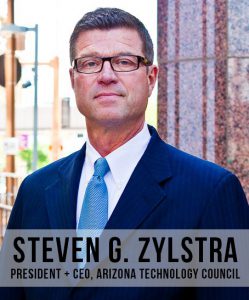TechFlash: Amid crisis, every Arizona student needs access to broadband, digital devices

 What should be the most memorable time of a young person’s life is now becoming a nightmare of sorts for our next generation.
What should be the most memorable time of a young person’s life is now becoming a nightmare of sorts for our next generation.
I’m referring to the devastating effects that the COVID-19 is having on U.S. students as they are forced to make their way through an education system that has changed literally overnight while at the same they deal with their own fears of what’s to come.
According to a new poll by Common Sense and SurveyMonkey, 95% of American teenagers report that in-person classes at their schools have been cancelled, while more than 60% are worried that they or someone in their family will be exposed to the coronavirus and it will have an effect on their family’s ability to earn a living.
Digging deeper into the numbers, 41% have not attended an online or virtual class since in-person school was canceled. Add to that, 12 million students nationwide live in homes without a broadband connection, a necessity to tap into online learning.
Fortunately, Common Sense not only has uncovered a problem but is offering solutions and a way to spotlight what’s at stake.
For those who are unfamiliar with the group, Common Sense is a nonprofit committed to improving the lives of children and families by providing the trustworthy information, education and independent voice they need to thrive. I am quite familiar with its mission as a member of the advisory council for the organization’s Phoenix office.
Common Sense is launching an effort to help close the digital divide and ensure every family has equal access to broadband. #ConnectAllStudents will leverage Common Sense Education’s network of more than 1 million U.S. educators to gather teacher and student experiences of the divide.
The campaign also calls on Congress to fund devices and broadband service so all students can connect to distance learning this school year. Details are at commonsense.org/connectallstudents.
Bigger digital divide
The digital divide is something all too familiar to Lupita Hightower, superintendent of the Tolleson Elementary School District in Phoenix, who said access to home broadband is critical to learning during school closures.
“Students and families from low-income backgrounds who lack devices and internet service at home are continuing to struggle to keep pace with their peers,” Hightower said. “It is imperative to provide essential tools and resources to all our students, closing the digital divide and increasing their chances for success.”
On a wider scale, Common Sense CEO James Steyer is alerting federal policymakers what is at stake. In a letter to Federal Communications Commission members dated March 24, Steyer wrote: “School closures due to the coronavirus pandemic have brought to the forefront what so many families have understood for years: Lack of access to computers and the internet at home limits learning, making it more difficult for children to keep up or develop the skills that are necessary for academic and professional success.”
With this new campaign and government pressure, Steyer is hoping to help close the digital divide.
He is joined in his efforts by Ilana Lowery, regional director for Common Sense in Arizona. “With the majority of kids now learning from home instead of school and struggling to keep connections with teachers, the nation is confronting a huge equity challenge, and it’s more critical than ever that students have access to technology for learning and safety no matter where they live,” Lowery said.
The Arizona Technology Council along with AZ StRUT (Arizona Students Recycling Used Technology), a 501(c)(3) nonprofit that supports Arizona’s technical education, already have launched a drive for the donation of laptops and chargers that can be refurbished for use by students. Companies can follow this link to submit a pick-up request, while individuals can donate used laptops at Batteries Plus stores throughout the Valley.
In the meantime, Common Sense Kids’ Action, the advocacy arm of the global organization, is tracking legislation and working to ensure that digital-equity programs remain a resource for vulnerable communities. “That’s why Common Sense is calling on Congress to ‘Connect All Students’ by providing emergency funds to close the digital divide once and for all,” Lowery said.
I join Common Sense in asking Arizona educators to share whether a lack of access to broadband and devices is affecting learning for their students. The group will highlight the stories to help raise awareness and identify solutions to address the challenges students, families and teachers are facing in the transition to virtual learning. Stories can be submitted at here.
Steve Zylstra is president and CEO of the Arizona Technology Council.
